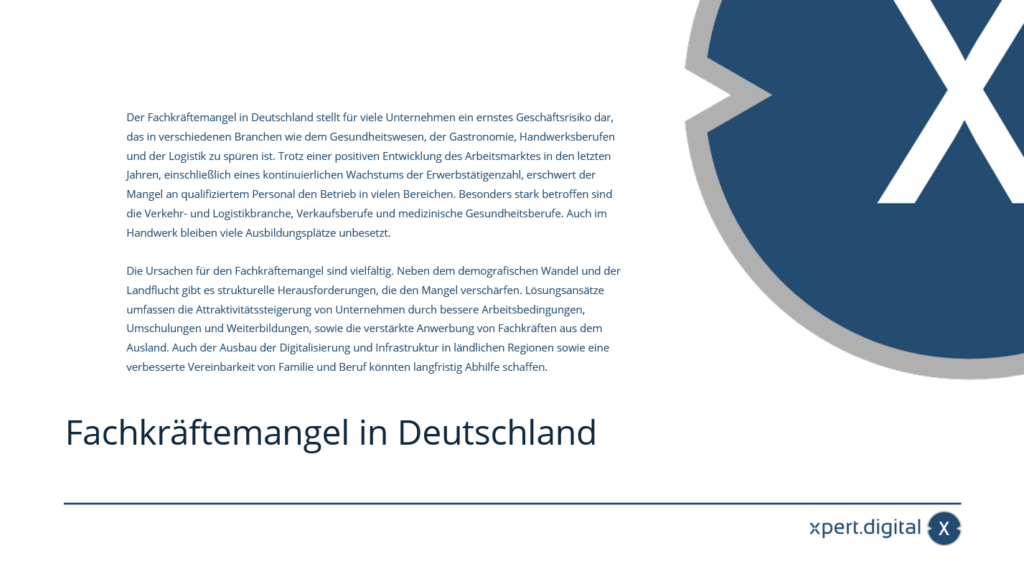Business risk for companies: shortage of workers, shortage of skilled workers and shortage of young talent – data, facts & figures
Language selection 📢
Published on: August 27, 2024 / update from: August 27, 2024 - Author: Konrad Wolfenstein

Business risk for companies: labor shortage, shortage of skilled workers and shortage of young talent - data, facts & figures - Image: Xpert.Digital
🏭 Labor shortage or lack of cheap labor? Why the discussion in Germany is going wrong
💡 Labor shortage or lack of cheap labor. Why the discussion in Germany is going wrong. Energy and personnel costs are not only the highest costs for companies, but also the most difficult to manage because the high taxes cannot be offset.
🔍 Differentiated consideration of the causes and effects of the labor shortage
The discussion about the labor shortage in Germany is complex and often controversial. It is not just about a shortage of workers in general, but also touches on deeper questions of wage policy, working conditions and socio-economic change within the German economy and society. It is often argued that there is not a shortage of workers per se, but rather of workers who are willing to work for the conditions offered. This discussion cannot simply be squeezed into black and white patterns; it requires a differentiated look at the causes, effects and possible solutions.
🔍 The multidimensionality of the labor shortage
The alleged labor shortage is closely linked to the debate about the high energy and personnel costs in Germany. Entrepreneurs and business associations regularly complain that these cost factors - exacerbated by high taxes and social security contributions - impair the competitiveness of German companies. However, it is important to understand that these costs cannot be viewed in isolation. They are embedded in a comprehensive system of social security and environmental responsibility that is designed for the long term and the restructuring of which can have far-reaching consequences.
🌐 The change in the world of work
Digitalization and globalization have led to profound changes in the world of work. Work processes are increasingly automated and digitalized, which on the one hand enables increases in efficiency, but on the other hand also leads to uncertainty. Many workers are faced with rapidly changing demands and must compete in a labor market that is increasingly flexible and demanding. This dynamic creates a mismatch between the skills that workers possess and the demands of the labor market.
🎓 Education and further training are key
A key challenge is to design the education and training system so that it meets the needs of a changing economy. Lifelong learning is increasingly becoming a necessity in order to survive in the labor market. However, despite various efforts, there are still significant gaps in the availability and accessibility of high-quality educational offerings, particularly in technical and digital career fields.
🌍 The role of immigration
Against the backdrop of demographic change, immigration is often discussed as a means of coping with labor shortages. In recent years, Germany has made significant efforts to attract qualified workers from abroad. However, integrating these workers presents its own challenges, particularly with regard to language acquisition and recognition of foreign qualifications.
💼 Working conditions and wage policy
The discussion about a lack of cheap labor inevitably leads us to the question of working conditions and wage policy. In many industries, employees are paid wages that are barely enough to live on, which leads to a precarious nature of employment relationships. The call for higher wages and better working conditions is not only a question of social justice, but also of economic reason. A well-paid and motivated workforce is more productive and contributes to the sustainability of the company's success.
⚖️ The importance of flexibility and security
The world of work in the 21st century requires a new understanding of flexibility and security. Employees are looking for ways to organize their work in a flexible way to better balance work and private life. Companies must recognize that flexible working models, such as home office or flexible working hours, not only meet the needs of their employees, but can also help to increase productivity. At the same time, flexibility must not come at the expense of social security. There is a need for innovative models that meet both requirements.
🏢 Labor shortage in Germany
The discussion about the labor shortage in Germany and the associated challenges of energy and personnel costs require careful and multi-dimensional consideration. It's not just about the number of workers available, but about the quality of jobs, the conditions under which these jobs are offered, and the ability of the economy and society to adapt to changing conditions. Education and training, the integration of workers from abroad, fair wages and good working conditions as well as a balance between flexibility and security are key elements that must be taken into account in the discussion. Only through the interaction of these factors can Germany meet the challenges of a changing world of work and create an economy that is sustainable, inclusive and competitive.
📣 Similar topics
- 🚀 Digitalization and workforce: opportunities and challenges
- 🏢 Companies and the cost burden: energy and personnel costs in focus
- 📈 Lifelong learning: key to combating the shortage of skilled workers
- 🌍 Globalization and immigration: A look at the labor market
- 💼 Improve working conditions: For a sustainable economy
- 💰 Wage policy and social justice: Why fair wages are important
- 📊 Demographic change: challenges and solutions
- 🧠 Further training in the digital era: paths and possibilities
- 🔧 Automation and the labor market: risks and potential
- 👨💼 Flexibility and security: A new working model
#️⃣ Hashtags: #labour shortage #wage policy #further training #digitalization #immigration
Our recommendation: 🌍 Limitless reach 🔗 Networked 🌐 Multilingual 💪 Strong sales: 💡 Authentic with strategy 🚀 Innovation meets 🧠 Intuition
At a time when a company's digital presence determines its success, the challenge is how to make this presence authentic, individual and far-reaching. Xpert.Digital offers an innovative solution that positions itself as an intersection between an industry hub, a blog and a brand ambassador. It combines the advantages of communication and sales channels in a single platform and enables publication in 18 different languages. The cooperation with partner portals and the possibility of publishing articles on Google News and a press distribution list with around 8,000 journalists and readers maximize the reach and visibility of the content. This represents an essential factor in external sales & marketing (SMarketing).
More about it here:
🚧 The fight for skilled workers: effects and solutions
📢 Skilled labor shortage in Germany: causes, effects and solutions
The shortage of skilled workers in Germany has become one of the most pressing challenges for the economy in recent years. This shortage of skilled workers affects many industries and has far-reaching effects on the economy and society. From healthcare to skilled trades to logistics, many companies are struggling to fill vacancies, which is increasingly perceived as a serious business risk. Despite an overall positive development of the labor market and an increasing number of employed people, the shortage of skilled workers is exacerbating the situation in many areas. Occupations in the healthcare sector, crafts and the transport and logistics sector are particularly affected.
📉 The current situation on the job market
The German economy recovered relatively quickly after the Corona crisis. In recent years, the number of people in employment has risen continuously, while the unemployment rate remained relatively stable until 2023, although it recently rose slightly to 5.7 percent. However, this positive development in the labor market paradoxically represents an additional challenge for companies as it makes it more difficult to find qualified personnel. The better the labor market situation, the more difficult it will be to find suitable skilled workers as the pool of available workers becomes smaller.
Some sectors are more affected than others. The need for qualified specialists in the transport and logistics industry, in sales professions (e.g. in retail) and in the medical sector (e.g. nursing professions) is particularly high. The craft sector also suffers from a significant lack of young talent. The number of unfilled training places was almost 70,000 in 2022. The situation is particularly dramatic in certain professions: in the areas of acting, dance and movement arts, for example, employers had to wait an average of 293 days to fill a vacancy. In the construction industry, the average vacancy time is also well over 200 days.
📊 Causes of the shortage of skilled workers
The causes of the shortage of skilled workers are diverse and complex. One of the main causes is demographic change. The baby boomer generation is increasingly retiring, while fewer young people are entering the labor market. Although the retirement age has been raised in recent years, there remains a significant gap in many industries because the vacant positions cannot be completely filled.
Added to this is the rural exodus, which primarily affects rural regions. Young, well-educated people are increasingly moving to urban areas where they can find better career opportunities and a higher quality of life. This creates bottlenecks in rural regions, while competition for qualified personnel continues to increase in cities.
Structural problems on the labor market further exacerbate the situation. Balancing family and work remains a challenge, especially for women, who continue to do a lot of the childcare. The employment rate of women is therefore lower than that of men, which represents untapped potential. In addition, many jobs, especially in the low-wage sector, are not very attractive, which leads to a low number of applicants.
💼 Impact on the economy
The shortage of skilled workers has a significant impact on the German economy. Many companies are forced to rethink their growth plans or postpone investments because they cannot find enough qualified staff. In some cases, the lack of skilled workers even means that companies have to limit operations or stop operations altogether. Small and medium-sized enterprises (SMEs) are particularly affected, as they often do not have the financial means to invest in expensive recruiting measures or to pay higher salaries.
The logistics industry, which plays a key role in the German economy, is suffering from a shortage of truck drivers and warehouse specialists. This leads to delivery delays and increased costs, which ultimately impact the entire economy. In the healthcare sector, the shortage of skilled workers has a direct impact on the quality of care. In nursing professions where the staff shortage is particularly serious, existing employees can hardly cope with the workload, which leads to an increased workload and an increase in sickness absence.
Crafts are also severely affected. Many companies can no longer process their orders at the usual speed, which leads to longer waiting times for customers. This not only affects customers' trust in the companies, but also leads to economic damage for the companies themselves.
🏋️♀️ Solutions to the shortage of skilled workers
In order to counteract the shortage of skilled workers, both short-term and long-term measures are required. One of the most important strategies is to increase the attractiveness of companies as employers. This includes financial incentives such as competitive salaries and bonuses, but also flexible working hours and the option to work from home. Younger employees in particular are increasingly attaching importance to a good work-life balance and meaningful work.
Another approach is the targeted further training and retraining of workers. Retraining unemployed or underemployed people can be a solution, particularly in professions with a high need for skilled workers. Programs that encourage transitions from low-skilled jobs to higher-skilled jobs could help alleviate skills shortages.
Recruiting skilled workers from abroad is another important measure. Germany has taken various measures in recent years to facilitate the immigration of qualified workers. However, the challenge remains not only to attract foreign skilled workers, but also to integrate them in the long term. This not only requires adapting immigration laws, but also reducing bureaucratic hurdles and promoting intercultural skills in companies.
In the long term, structural problems must be addressed in order to sustainably combat the shortage of skilled workers. Expanding digitalization and infrastructure in rural regions could help stop the brain drain of young skilled workers and increase the attractiveness of these regions. Likewise, an improved compatibility of family and work could help more women to be integrated into the labor market and the employment rate to increase.
Another important aspect is the promotion of MINT subjects (mathematics, computer science, natural sciences and technology) in schools and universities. These areas are particularly affected by a shortage of skilled workers, even though they are crucial for the future of the German economy. Targeted educational programs and the promotion of girls and women in these areas could ensure the next generation of young people and reduce the shortage of skilled workers in these key areas.
🔍 Short-term solutions and long-term strategies
The shortage of skilled workers in Germany is a complex challenge that can only be overcome through the interaction of various measures. Short-term solutions such as the recruitment of skilled workers from abroad and the targeted further training of workers are just as important as long-term strategies to improve the compatibility of family and work, to promote MINT subjects and to increase the attractiveness of rural regions. Only through a coordinated approach can we overcome the shortage of skilled workers and secure the future viability of the German economy.
Overall, it is clear that the shortage of skilled workers is not just a problem for individual companies, but rather represents a challenge for society as a whole that must be addressed together by politics, business and society. This is the only way Germany can maintain its position as one of the world's leading economic nations in the long term.
📣 Similar topics
- 👥 Skilled labor shortage in Germany: causes, effects and solutions
- 📊 The current situation on the job market
- 🔍 Causes of the shortage of skilled workers
- 💹 Impact on the economy
- 🛠️ Solutions to the shortage of skilled workers
- 📅 Short-term measures to combat the shortage of skilled workers
- 🔧 Problems in rural regions: rural exodus and its consequences
- 👩🏫 Compatibility of family and work
- 🌎 Recruiting skilled workers from abroad
- 📚 Promoting MINT subjects: A key to combating the shortage of skilled workers
#️⃣ Hashtags: #Skills shortage #Labor market #Economy #Further education #Migration
We are there for you - advice - planning - implementation - project management
☑️ SME support in strategy, consulting, planning and implementation
☑️ Creation or realignment of the digital strategy and digitalization
☑️ Expansion and optimization of international sales processes
☑️ Global & Digital B2B trading platforms
☑️ Pioneer Business Development
I would be happy to serve as your personal advisor.
You can contact me by filling out the contact form below or simply call me on +49 89 89 674 804 (Munich) .
I'm looking forward to our joint project.
Xpert.Digital - Konrad Wolfenstein
Xpert.Digital is a hub for industry with a focus on digitalization, mechanical engineering, logistics/intralogistics and photovoltaics.
With our 360° business development solution, we support well-known companies from new business to after sales.
Market intelligence, smarketing, marketing automation, content development, PR, mail campaigns, personalized social media and lead nurturing are part of our digital tools.
You can find out more at: www.xpert.digital - www.xpert.solar - www.xpert.plus

























